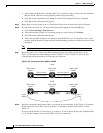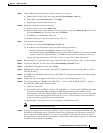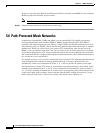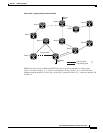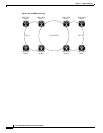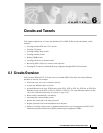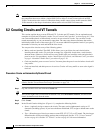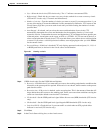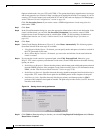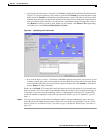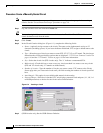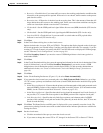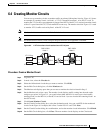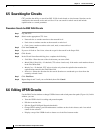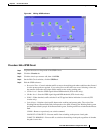
6-4
Cisco ONS 15454 Installation and Operations Guide
November 2001
Chapter 6 Circuits and Tunnels
Creating Circuits and VT Tunnels
Options include node, slot, port, STS, and VT/DS-1. The options that display depend on the circuit type
and circuit properties you selected in Step 3 and the cards installed in the node. For example, if you are
creating a VT circuit or tunnel, only nodes with XCVT and XC10G cards are displayed. For Ethergroups,
see the “Ethernet Circuit Configurations” section on page 9-6.
Click Use Secondary Source if you need to create a UPSR bridge/selector circuit entry point in a
multivendor UPSR.
Step 7 Click Next.
Step 8 In the Circuit Destination dialog box, enter the appropriate information for the circuit destination. If the
circuit is bidirectional, you can click Use Secondary Destination if you need to create a UPSR
bridge/selector circuit destination point in a multivendor UPSR. (To add secondary destinations to
unidirectional circuits, see “Create a Unidirectional Circuit with Multiple Drops” procedure on
page 6-8.)
Step 9 Click Next.
Step 10 Under Circuit Routing Preferences (Figure 6-2), select Route Automatically. The following options
(described in detail in the next step) are available:
• Using Required Nodes/Spans—If selected, you can specify nodes and spans to include or exclude in
the CTC-generated circuit route.
• Review Route Before Creation—If selected, you can review and edit the circuit route before the
circuit is created.
Step 11 If you want the circuit routed on a protected path, select Fully Protected Path. Otherwise, go to
Step 12. CTC creates a primary and alternate circuit route (virtual UPSR) based on the nodal diversity
option you select:
• Nodal Diversity Required—Ensures that the primary and alternate paths within path-protected mesh
network (PPMN) portions of the complete circuit path are nodally diverse. (For information about
PPMN, see the “Path-Protected Mesh Networks” section on page 5-50.)
• Nodal Diversity Desired—Specifies that node diversity should be attempted, but if node diversity is
not possible, CTC creates link diverse paths for the PPMN portion of the complete circuit path.
• Link Diversity Only—Specifies that only link-diverse primary and alternate paths for PPMN
portions of the complete circuit path are needed. The paths may be node-diverse, but CTC does not
check for node diversity.
Figure 6-2 Setting circuit routing preferences
Step 12
Click Finish or Next depending on whether you selected Using Required Nodes/Spans and/or Review
Route Before Creation:



